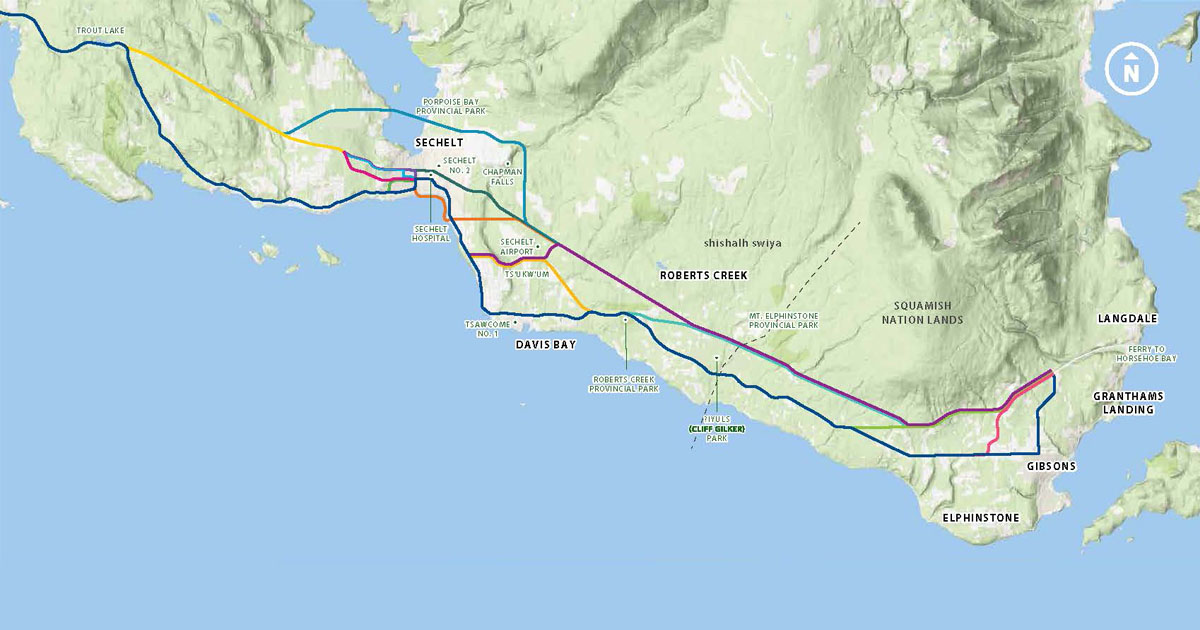Highway 101 Alternate Route Planning Study
The Ministry of Transportation and Transit partnered with the shíshálh Nation to deliver the Highway 101 Alternate Route Planning study. The ministry also collaborated with the Squamish Nation and engaged with local governments at key milestones throughout the study’s life cycle.
Read the final report
- Highway 101 Alternate Route Planning Study – Summary (PDF, 3.2MB)
- Highway 101 Alternate Route Planning Study - Technical Report (PDF, 22.8MB)
Final Report Individual Chapters
Acknowledgement and Executive Summary
Section 1: Introduction
1.1 Study Area
1.2 Study Purpose
1.3 Study Scope
1.4 Study Methodology
1.5 Community Engagement
Section 2: Previous Studies
2.1 Gibsons Bypass Extension Planning & Design Study (1995 to 2005)
2.2 District of Sechelt Transportation Master Plan (2009)
2.3 Highway 101 Gibsons to Sechelt Corridor Study (2020)
2.4 Retained Alternate Route / Bypass Options from Previous Studies
Section 3: Background Conditions
3.1 Highway 101 Overview
3.2 Land Use and Population
3.3 Future Development
3.4 Other Modes
Section 4: Existing and Future Traffic Conditions
4.1 Existing Traffic Conditions and Characteristics
4.2 Future Traffic Forecasts
Section 5: Option Development
5.1 Considerations
5.2 Design Objectives
5.3 Design Criteria for Alternate Routes
5.4 Alternate Route Options
5.5 Pre-Screening
Section 6: Option Evaluation Framework
6.1 Option Evaluation Framework Description
6.2 Option Evaluation Framework
6.3 Option Evaluation Framework Application
Section 7: MAE Step 1 – Preliminary Evaluation
Section 8: MAE Step 2 – Final Option Evaluation
8.1 Final Option Evaluation
8.2 Comparison of End-to-End Route Options
Section 9: Recommendations
9.1 Findings by Segment
9.2 Other Routes Considered
Technical Report Appendices
The purpose of the study was to develop a clear and supported long-term plan for the provincial highway network on the Sunshine Coast between Gibsons and Sechelt.
Technical analysis conducted as part of the study determined that most travel on the Sunshine Coast consists of short trips between neighbouring municipalities, rather than long-distance travel along the entire corridor. As a result, a new route spanning the full length of the study area would likely see low traffic volumes. While there is no foreseeable need for a full, end-to-end bypass route based on demand alone, key locations could benefit from an alternate route to address congestion, reliability, and growing safety challenges. As communities continue to grow, it is becoming increasingly important to protect the role and function of the existing highway for inter-regional and local travel, including planning for transit and active transportation, safety, climate change, and environmental protection.
Public engagement
The Highway 101 Alternate Route Planning Study public engagement opportunity was held from June 23 to August 31, 2022. We thank everyone who participated for their interest.
Review the public engagement materials:
- Engagement Summary Report (PDF, 8.9MB)
- Overview map (PDF, 6.2MB)
- Highway 101 Alternate Route Planning Study display boards (PDF, 4.5MB)
- July 2022 information session presentation
- Q&A summary from the information sessions
Engagement results
Feedback received was compiled into an engagement summary report, including a summary of what we heard, for review and consideration by the study team. This helped refine the list of feasible options for further analysis and costing.
Following public engagement the Ministry of Transportation and Transit continued to partner with shishalh Nation, collaborated with Squamish Nation, and engaged with local and regional governments to complete the study. This included detailed technical analysis and a multiple account evaluation to rank the alternatives and eliminate options that are no longer viable.
Previous study (September 2020)
The Highway 101 Gibsons to Sechelt Corridor Study explored options to improve the safety and operations of the corridor. The objective of the study involved the recommendation of short-, medium-, and long-term improvement options to mitigate any identified existing or future safety or operations deficiencies on the corridor.
Subscribe
Enter your email address to subscribe to updates of this page.
Contact information
Friendly Url for this Page:
gov.bc.ca/highway101
Contact us if you have questions about this study.

